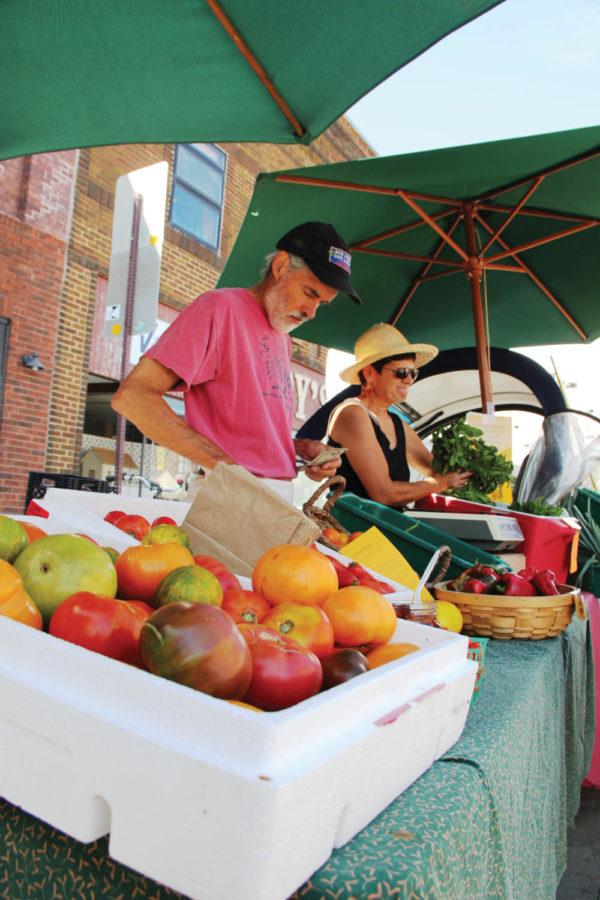Buy local, stay local: Contributing to a sustainable economy
Photo: Kelsey Kremer/Iowa State
Jon Lynch and Lonna Nachtigal, of Onion Creek Farms, organize their goods at the Ames Famer’s Market on Saturday, Aug. 27. The Ames Farmer’s Market hosts a variety of stands, all of local flavor.
September 1, 2011
You’ve been there: Standing in line at Walmart, your cart filled with frozen meals and fruits and vegetables from who knows where. When it comes time to pay, you swipe your card and are (thankfully) approved … now what?
Hopefully, you are aware money is being taken out of your account, but do you know who is on the receiving end? The average college student doesn’t consider this economic cycle when passing through the checkout line. What if we told you that you can know, for sure, where your money is going?
Buying local is the easiest way to know where your money is going and where the produce you eat is coming from. At the Ames Main Street Farmers Market, community members can purchase healthy food and personally chat with the farmers responsible for growing them. There are several booths representing local area farms. One in particular is the Onion Creek Farm, located in northwest Ames.
Onion Creek Farm has been selling food to the community and local businesses since 1995. Owned and operated by Joe Lynch and Lonna Nachtigal, they have been exemplifying sustainability since 1990. “It’s a wonderful way to make a living,” Lynch said.
The couple enjoys being outside and building relationships with local buyers. However, Lynch said the downside of selling at the farmer’s market: waking up at 5 a.m. for the day’s preparations. But this is just a small hassle when compared to “the satisfaction of being able to grow food and bring it close by to sell locally.” You can find produce from Onion Creek Farm at Stomping Grounds, The Café and Wheatsfield.
If vegetables aren’t your thing, you can still contribute to the local economy by purchasing home-grown meats at the farmer’s market. “If you spend money here, it stays here,” said owner Del Johnston regarding the benefit of selling at the farmer’s market.
Johnston and his partner, Chad Steenhoek, are the owners of Good Seed Farms. Both take pride in knowing the complete history of their livestock. “So this guy was being tough, and we turned him into hamburger,” Steenhoek joked.
Aside from having a good sense of humor, the owners invest their time in ensuring the animals stay on a healthy grain diet and avoid administering growth hormones. Their family-owned farm sells home-raised pork, beef, chicken and eggs.
Buying local food isn’t the only way you can contribute to the local economy. The Ames Main Street Farmer’s Market also features other local businesses selling things from coffee to homemade cloth napkins.
Entertainment also lines the streets, including dancers and DJs from radio station 105.9. Combined, these features make the Farmer’s Market a social event as well.
Mike Duffy, director of the Beginning Farm Center and economics professor at Iowa State, believes the social aspect is one of the most important functions of the farmer’s market. “The more farmers we have, the better off.”
He clarified by saying that farmers raise families, and the more families present, the more vibrant the community. The farmer’s market is an outlet for all the people in the community to come together and interact, contributing to a sustainable community.
The Ames Main Street Farmers Market is a fun way for buyers to know exactly where their money is going and that they are choosing good foods. Attending the farmers market allows consumers to purchase local foods and be able to understand the practices each farmer uses to grow their produce.
“The Farmers Market benefits by bringing in massive local products, veggies, meats, eggs, cheese, honey, a great atmosphere for families (live music), a good opportunity for consumers to get to know their farmers and to understand the products they are purchasing,” said Angela Moore, executive director of the Main Street Cultural District. “It has been a great first year. The vendors have sold out on different products on different days. We are glad to see more students at the farmers market now that they are back in school.”
By purchasing meat and produce from the farmers market, you can enjoy delicious foods while contributing to a sustainable community. That sounds like a win-win situation to us.







